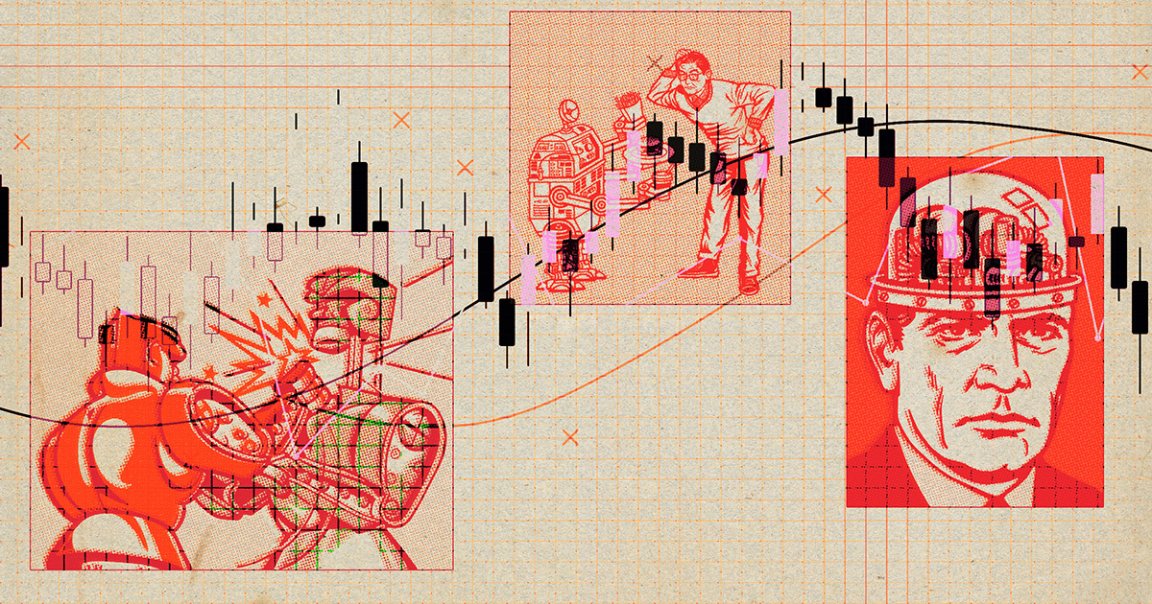
Rose Creek Without a Paddle
Fourth quarter earnings season is in full swing, and despite budgets larger than some countries’ GDPs, big tech companies’ financial statements are looking grim.
Even after president Donald Trump’s announcement of a $500 billion AI infrastructure deal, the so-called “magnificent seven” (M7) stocks — the Wall Street nickname for Google, Meta, Nvidia, Tesla, Apple, Microsoft, and Amazon — are slumping.
Once thought to be airtight, analysts are now warning that it may be time for investors to sell.
Tesla and Google both whiffed at earnings expectations, sending their shares into a tailspin — Tesla’s share price has tumbled 15 percent over the past month, while Google’s parent company Alphabet saw its stock valuation drop by 9 percent in a single day. Nvidia, meanwhile — which was previously printing money as the de facto provider of shovels for the AI gold rush — saw almost $600 billion evaporate within hours of DeepSeek’s announcement that it had developed one of the most efficient AI language models we’ve seen, suggesting a future far less dependent on its chips than previously anticipated.
And though Apple, Amazon, and Meta slightly exceeded quarterly expectations, they didn’t return the same kind of explosive growth the market has learned to expect, prompting Goldman Sachs strategists to change its tune on big tech’s AI strategy.
The disappointment isn’t just internal. Compared to the S&P 500 — of which the behemoths of the M7 make up a third — the tech giants’ stock growth has slowed to a crawl. Whereas the S&P 500 has grown 2.6 percent since January 1 and the NASDAQ Composite has made gains of 3 percent, as Barron’s points out, a quick glance at M7’s stock performance shows growth of just 1 percent. All together, the M7 aren’t looking like the long-term golden goose investors had counted on.
While some of this can be traced to the optics of big tech’s rightward turn — Tesla sales, for example, have fallen down a pit while its CEO Elon Musk guts the federal government — it might more accurately be called a collective groan as rampant AI spending fails yet again to produce any meaningful returns.
“There is no question either way that the high capital spending will continue to come under increasing scrutiny until investors can better understand the return on today’s massive investments,” stock market analyst Adam Parker told Barron’s.
Over the past two years, companies like Google have taken to ransacking huge swaths of their workforce in order to dump resources into AI research, with a particular emphasis on “scaling.” That’s the widely parroted belief that simply increasing the number of computing power will lead to better and better AI. The M7 bought into that hook-line-and-sinker, and so did investors, dumping billions of dollars into AI ventures on the assumption that the line would only go up.
Now, Barron’s reports, the group’s spending-to-sales ratio has hit a record high of 14.5 percent, showing that big tech is no closer to delivering on its lofty promises than it was a year ago.
Though the tech giants are showing no signs of slowing down on AI spending yet, it’s a sign that their leash isn’t infinite — and that Wall Street, not Silicon Valley, has the final word.
More on tech stocks: Nancy Pelosi’s Husband Sold a Boatload of Nvidia Stock Right Before It Was Eviscerated by Chinese Startup